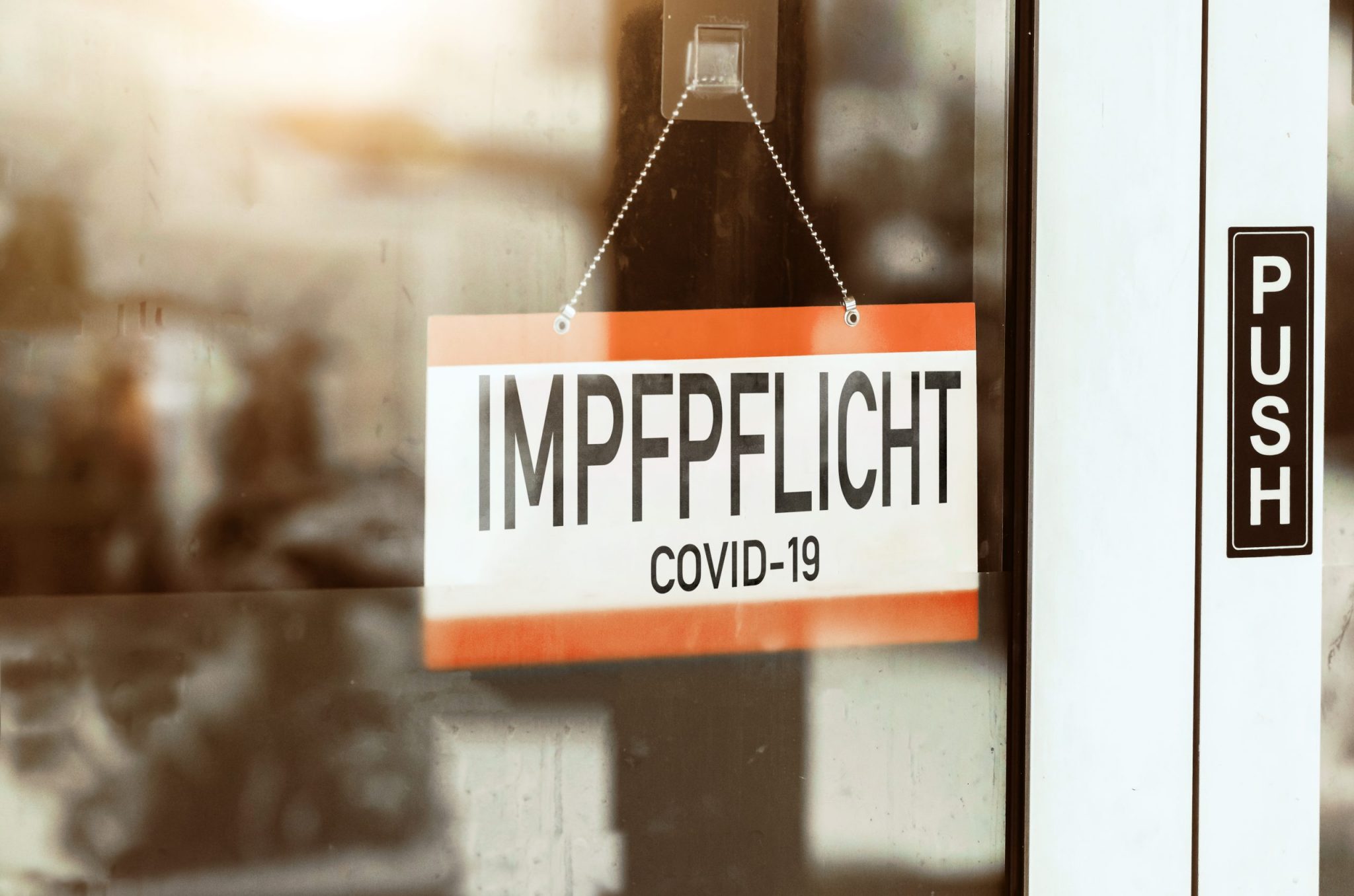July saw a continuation of foreign actors’ active engagement in German online political discourse through state-backed media and diplomatic accounts. As in previous months, Russian actors put a particular emphasis on disseminating anti-vaccination narratives. They presented incomplete information and distorted facts regarding vaccinations and vaccination mandates. Russian accounts continued to negatively portray the Greens’ chancellor candidate Annalena Baerbock and spread doubts about democratic institutions. In contrast to previous months, China did not only focus on its usual topics—the achievements of the Chinese Communist Party and a positive depiction of the situation in Xinjiang—but also extensively addressed the issue of Covid-19’s origin. China’s messengers vigorously advocated against a politicization of the debate and even alleged that the virus originated in the United States. Turkey’s coverage centered on the celebration of “Democracy and National Unity Day” in commemoration of the failed coup attempt in 2016. Iranian actors focused on domestic topics, the Iran Nuclear Deal (JCPOA), and a diplomatic feud with Slovenia.
Russia
Covid-19
In July, Russian state-backed accounts continued their focus on coronavirus-related issues. A particular emphasis was vaccinations and reporting on vaccination mandates. The hashtag “Impfpflicht” (vaccination mandate) was the second most used hashtag by Russian accounts in July. While German media also reported on the topic, Russian media’s disproportionate focus on the topic was striking. Over the course of the year, Russian state-backed accounts have tweeted about the issue more than all other monitored accounts. RT Deutsch is the most influential account on the topic.

Top accounts, top key phrases and hashtags, and tweet volume by Russian (blue) and German media (gray) for “Impfpflicht” in 2021.
Most of the content under the hashtag “Impfpflicht” focused on the situations in foreign countries such as France, Italy, and the United States, at times with misleading information. One headline stated that people in France cannot enter museums, cinemas, or swimming pools without proof of vaccination. In fact, a negative Covid-test also suffices for entering such facilities. Russian media extensively covered protests against vaccination mandates in Russia, Italy, Greece, and France.
When these mandates became a central topic of debate in Germany in July, Russian media also reported on the situation in Germany. Russian tweets devoted particular attention to statements by politicians who did not want to generally preclude compulsory vaccinations, such as the Greens’ chancellor candidate Annalena Baerbock, Baden-Württemberg’s Minister President Winfried Kretschmann, and the parliamentary ombudswoman for the armed forces Eva Högl. A tweet by SNA News provocatively asked what the unvaccinated are allowed to do in Germany. The article featured some of the most outspoken proponents of compulsory vaccinations without mentioning the backlash that some of their statements have provoked—even among some of their party colleagues. Ultimately, the article conveyed the false impression that Germany is very close to mandating vaccinations for all citizens and strongly discriminating against unvaccinated people.
RT Deutsch’s top YouTube videos also focused on vaccinations. The top six videos all dealt with vaccinations and collectively received more than one million views. One video by RT Deutsch unfoundedly suggested that the government planned to fine vaccination deniers, while another one described the much-debated French introduction of a health pass as the beginning of a dystopian future. The most watched video in July discussed the death of a 13-year-old, which was allegedly related to receiving the Pfizer vaccine.
Russian media’s outsized focus on vaccinations was also apparent in how it reported on different vaccines. RT Deutsch was the most retweeted account for tweets about all four vaccines currently approved by the European Medicines Agency (EMA): Pfizer/BioNTech, Moderna, Astra Zeneca, and Johnson and Johnson.
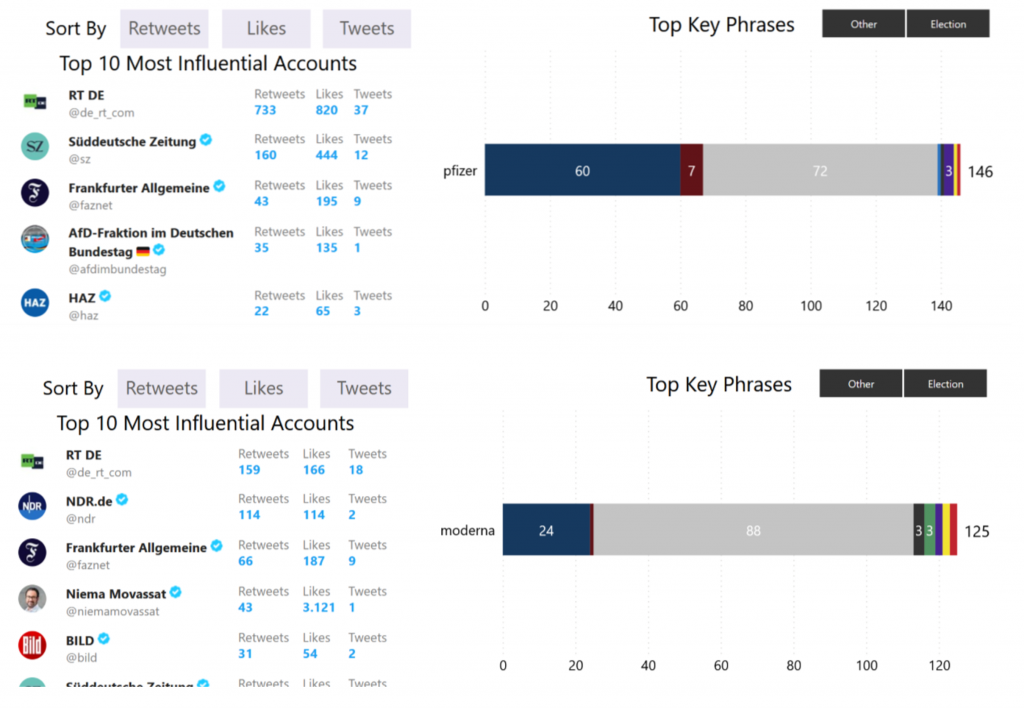
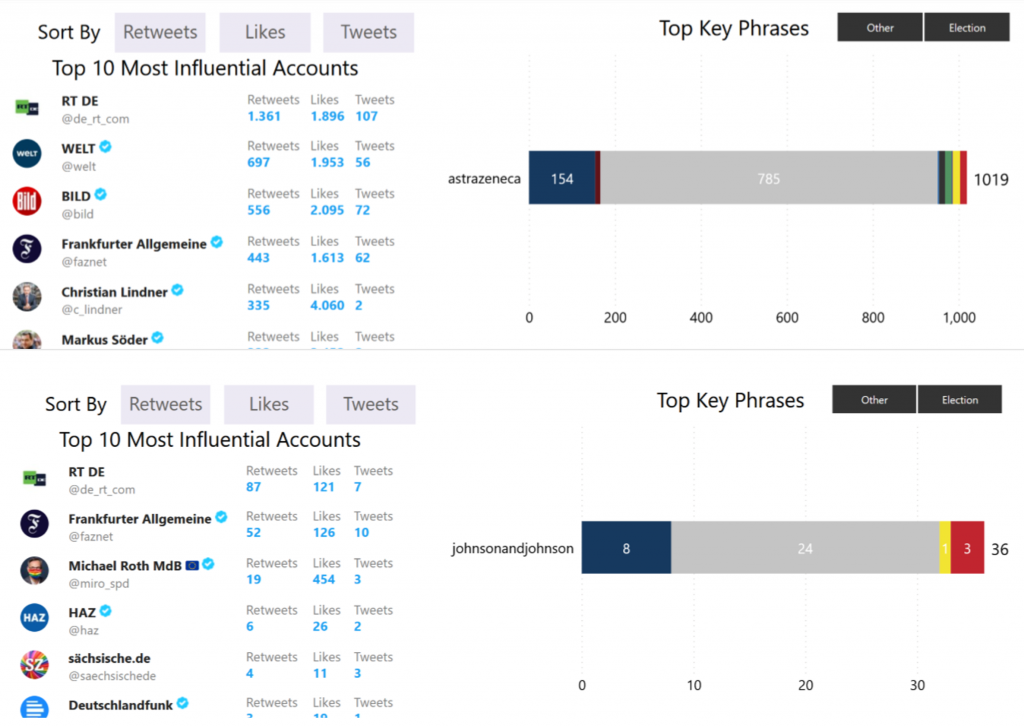
Mentions of “Pfizer,” “Moderna,” “AstraZeneca,” and “JohnsonandJohnson” between January 1 and July 31, 2021 by all accounts monitored on the dashboard. (Russian media’s mentions are pictured in blue, Turkish media’s in dark red, German media’s in gray, and German politicians’ in the remaining colors.)
The reports on Western vaccines revolved primarily around, and frequently misrepresented, possible negative side effects of the vaccines. July’s top tweet by Russian actors stated that the World Health Organization (WHO) warned against cross-vaccinations, while German health minister Jens Spahn advocated for them. The statement was partly factual; however, the WHO recommendation stipulated that an exception was the receipt of an AstraZeneca jab followed by a BioNTech/Pfizer or Moderna shot, which was, in fact, the combination that Spahn had recommended. By leaving out this important piece of information, RT Deutsch insinuated malicious intent from Spahn to promote cross-vaccinations despite the WHO’s warning. Another headline misrepresented numbers published by the German Paul Ehrlich Institut, presenting the number of post-vaccination sicknesses and deaths as being causally and not just temporally related. This context was added in the article but left out of the headline. RT Deutsch’s editorial opposition to vaccinations was also apparent in a tweet that spoke disparagingly of Karl Lauterbach, a social democratic politician who has become one of the targets of Covid and vaccine-skeptics. The tweet was the most liked Russian state-backed media tweet in July.
In contrast to German media, the delta variant was not an important topic for Russian state-backed media in July. RT Deutsch even accused the media and politicians of exaggerating the dangers of different variants and stoked fears of a “Forever-Covid” pushed by fabricated media campaigns.
Many of RT Deutsch’s articles gained significant traction on Facebook. Not entirely surprisingly, CrowdTangle data revealed that many articles about vaccination mandates and the alleged risks of vaccines circulated in different anti-vaccination Facebook groups, such as “Impfen nein danke Schluss mit der Corona Diktatur (sic)” (vaccinations no thank you end the corona dictatorship). Many of these groups were marked by government skepticism and revealed primarily right to far-right tendencies. Regional-level politicians from the far-right party AfD, among them Gunnar Lindemann, a member of the Berlin state legislature, also shared Russian state-backed content. Fringe Facebook pages, such as “Der Infoblog,” that publish information from various dubious sources were the third group that disseminated RT Deutsch’s content in July.
Federal Election Campaign
Russian media’s negative reporting on the Greens’ chancellor candidate Annalena Baerbock continued in July. All top tweets regarding Baerbock covered her in a negative way or revolved around scandals.
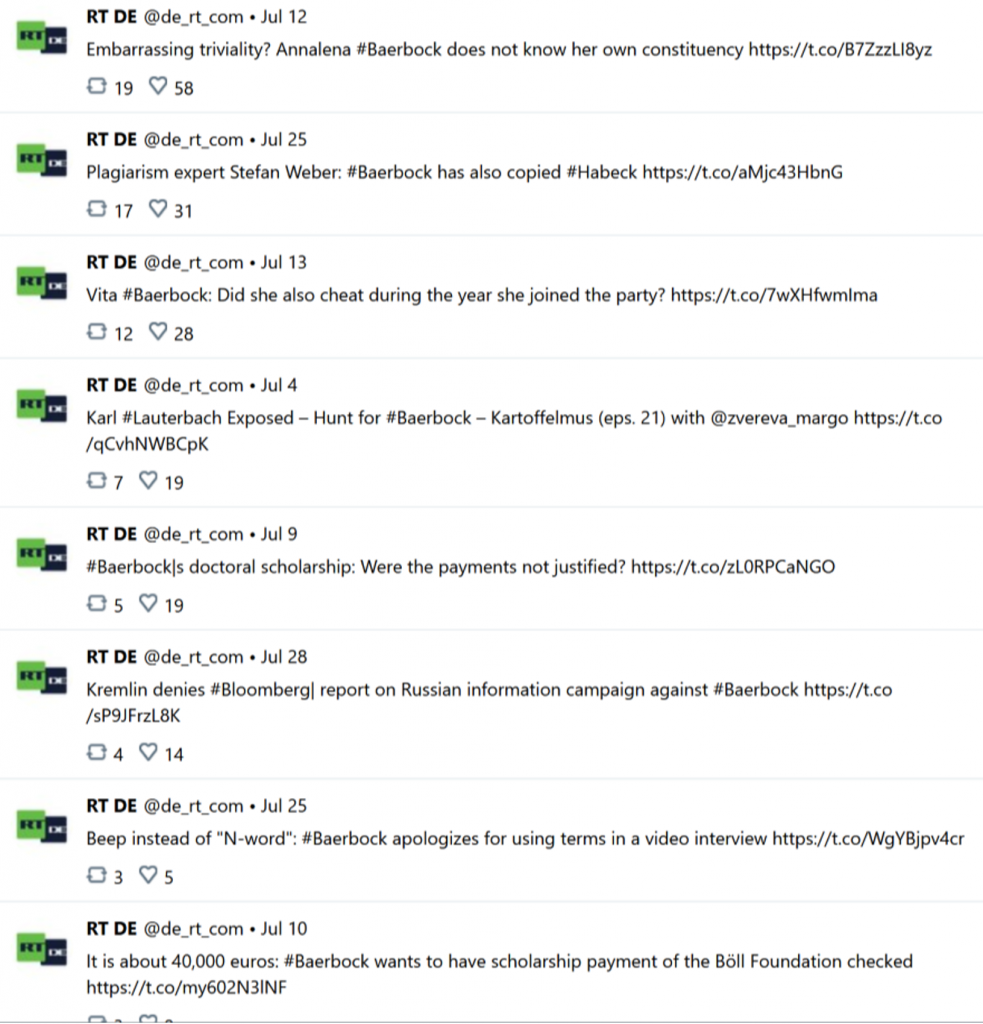
Top tweets for “Baerbock” between July 1 and July 31, 2021 by Russian state-backed media.
Despite several controversies around Armin Laschet in July, Russian actors’ coverage of the CDU’s chancellor candidate was rather limited compared to German media’s reporting. In the beginning of July, German media scrutinized Laschet for a lack of distance to the far-right CDU candidate Hans-Georg Maaßen; in mid-July, he was criticized for his management of the catastrophic flooding in his home state and his demeanor during an interview with German Federal President Frank-Walter Steinmeier; and, at the end of the month, he was charged with plagiarism. Russian media also touched on Laschet’s flood management and the allegations of plagiarism, but did not cover the topics as extensively as their German counterparts. The graph below illustrates the peaks in German reporting about Laschet and the lack thereof from Russian media. This difference in coverage is striking given the extensive attention that Russian media has paid to Annalena Baerbock’s alleged missteps during the campaign.
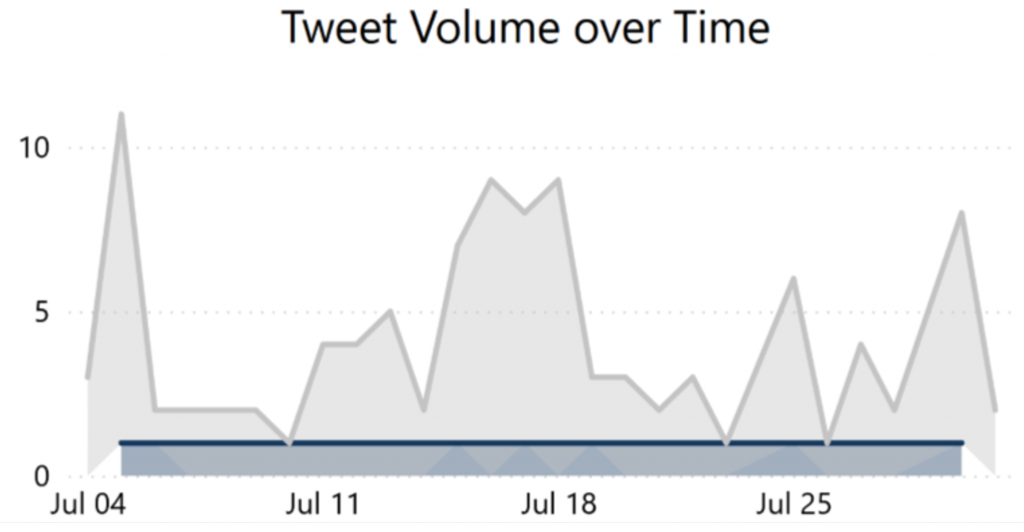
Mentions of “Laschet” between July 1 and July 31, 2021 by Russian state-backed media (blue) and German media (gray).
One of Russian state-backed actors’ most-liked tweets in July discussed the German far-right party AfD rejecting the constitutional judges in an upcoming legal process against Chancellor Angela Merkel. The chancellor is accused of violating the neutrality law in the context of a disputed regional election last year. The AfD rejected the judges and accused Merkel of disrespecting principles of rule of law as Merkel had allegedly recently invited some of the judges to dinner in the chancellery. RT Deutsch echoed these allegations and embedded a tweet by the AfD’s top candidate for the federal elections, Alice Weidel, in their article. Data from CrowdTangle shows that this story was shared in German-language far-right Facebook groups such as “I mistrust the government,” which aims to “uncover the government’s corona lies.” A local AfD section from Vorpommern-Greifswald and an AfD candidate for the Mecklenburg-Vorpommern state legislature also disseminated the article on Facebook.
Foreign Policy
Russian state-backed media extensively covered events relating to the Nord Stream 2 gas pipeline in July. Nord Stream 2 was the most mentioned key phrase and hashtag by Russian accounts throughout the month, with a particular peak in mentions around July 22 when Germany and the United States came to an agreement about the completion of the pipeline. While some of the coverage of the topic was factual and neutral, other coverage was very emotional in tone and language. One tweet described the German-American agreement as a “pact for looting,” complained about the weaponization of energy, and accused Germany and the United States of deindustrializing Eastern European countries. Another tweet stated that Germany and Europe would not be able to take full advantage of energy diversification through Nord Stream 2 until they “throw off the shackles of US-bondage.”
Alleged Mistreatment of RT Deutsch
On Twitter, RT Deutsch featured a clip from a press conference led by Russian Foreign Ministry Press Secretary Maria Zakharova. In the video, she condemned “harassment and attacks on Russian media and journalists” working in Germany. She accused other German outlets of waging an “information war” against RT Deutsch by disparaging the outlet as “propaganda.” Given these circumstances, Zakharova stated that she considered “the limits of our good relations, which are founded on the mutual respect of free speech” to be dangerously close. The Russian statement came after RT Deutsch faced difficulties obtaining a license for its planned TV channel RT Deutsch TV. The fact that this issue warranted discussion by the Russian press secretary illustrates the importance for Russia of state-backed media activities in Germany.
China
In July, Chinese state-backed actors extensively dealt with the topic of the origin of the coronavirus. “Covid19” was the month’s top hashtag used by Chinese accounts. In their tweets, they demanded a depoliticization of the debate around the origin of the virus. Chinese accounts noted that 48 countries had advocated to the World Health Organization (WHO) against a politicization of the tracing of the origin of the virus. They also shared an article in which German Professor Christian Drosten and other virologists called for a scientific examination of how the virus reached humans and warned against “speculation” and “stigmatization.” These tweets followed reports that the Biden administration now considers the possibility that the virus escaped a lab in Wuhan, China to be a credible option. In July’s top tweet, China’s consul general Du Xiaohui listed four things “the US should explain first about Covid-19 origins.” The questions his tweet posed clearly sought to associate the United States with the outbreak of the virus.
“Xinjiang” was the top key phrase used by Chinese accounts in July. As in previous months, tweets denied allegations of mistreatment of the Uyghur population and stressed the equality of different ethnicities in the region. The Chinese Embassy in Germany’s twitter account featured German Green party member Jürgen Kurz twice making favorable statements about the situation in Xinjiang. Kurz alleged that accusations of human rights violations are part of the U.S. strategy to prevent the rise of China.
As in June, “#CPC100,” a hashtag celebrating the 100th anniversary of the Chinese Communist Party (CCP), was one of the top hashtags. In the context of the CCP’s anniversary, Chinese tweets highlighted various statements from President Xi Jinping’s speech at the ceremony. The focus was primarily on highlighting Chinese progress and accomplishments, but one tweet also stressed that “sanctimonious preaching from those who feel they have the right to lecture us” would not be accepted.
Turkey
In July, Turkish actors commemorated “Democracy and National Unity Day,” which celebrates the averted coup from July 15, 2016 (15 Temmuz in Turkish). The five most popular hashtags used by Turkish actors in July were all related to the holiday.
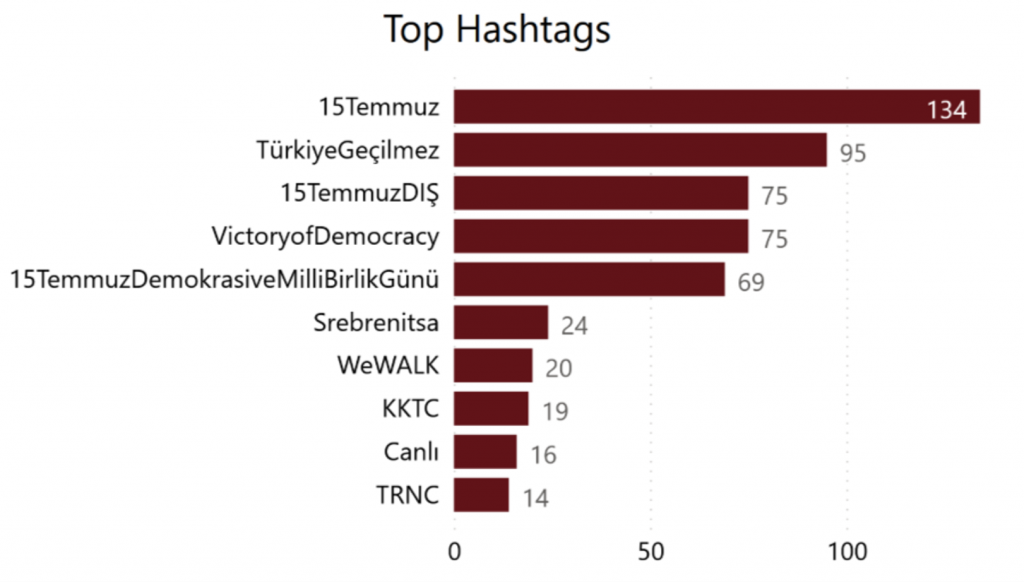
Top hashtags between July 1 and July 31, 2021 used by Turkish state-backed accounts.
The significance of this holiday for the Turkish accounts led to greater online activity overall. The number of Turkish tweets went up considerably on July 15, and the five most popular hashtags of the year were all related to the holiday.
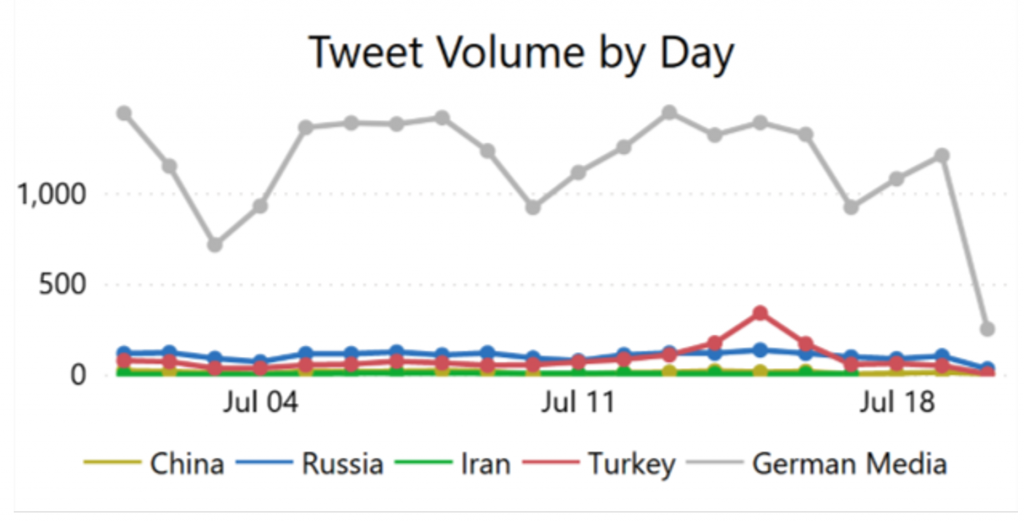
Number of tweets between July 1 and July 20, 2021.
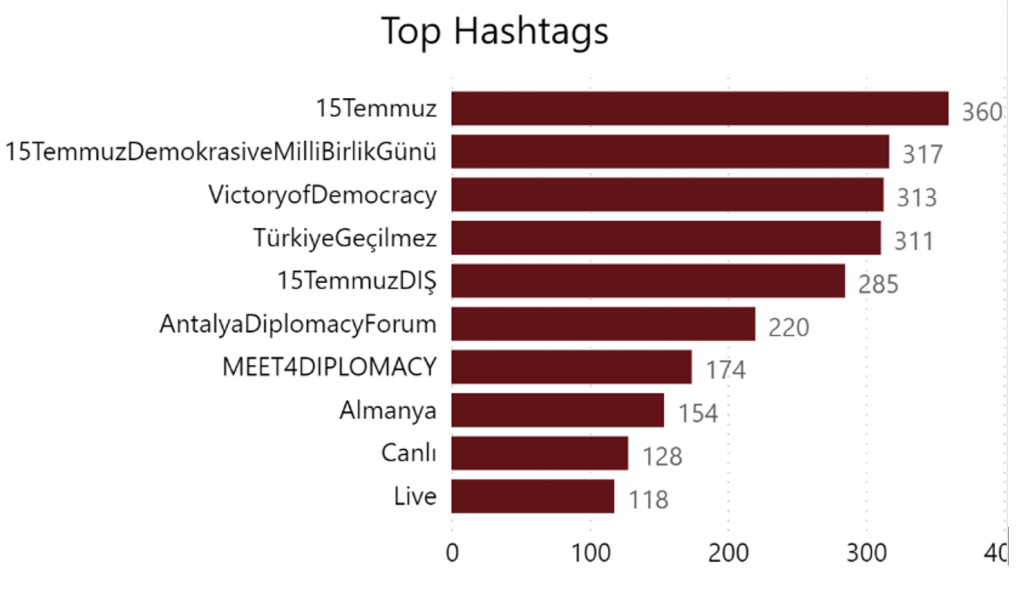
Top hashtags between January 1 and July 31, 2021 used by Turkish state-backed accounts.
The Turkish attempt to remember July 15 as a “Victory of Democracy” is particularly interesting in light of the important role that the averted 2016 coup has played in President Erdogan’s increasingly authoritarian consolidation of power. While mostly diplomatic accounts used the hashtags, state-backed media outlet TRT Deutsch also widely discussed the issue, at times in an emotional way, for instance in a clip highlighting a first-hand account of the coup attempt.
July’s two most retweeted tweets by Turkish actors addressed the Srebrenica massacre in which more than 8,000 Bosnian Muslims were killed in July 1995. While this event received very little attention from all other actors, the hashtag “Srebrenitsa” was one of the most used hashtags by Turkish actors in July. This continues the trend seen in earlier months of Turkish accounts and state-backed media giving significant attention to violence against Muslims and Islamophobia in Europe.
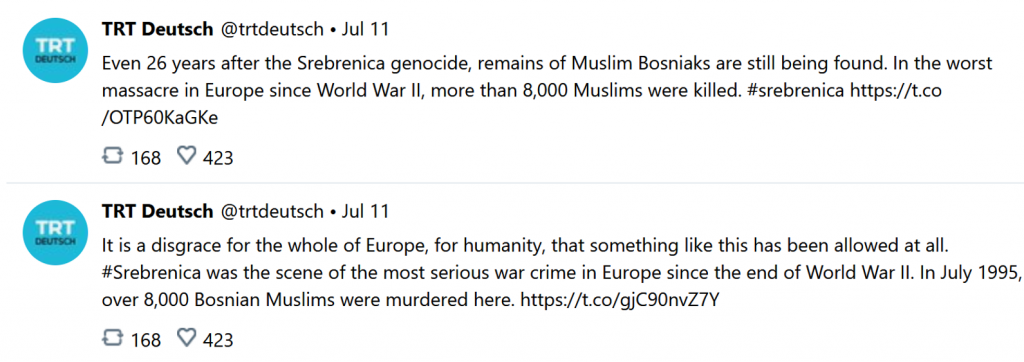
Another important topic in July was the flooding in western Germany. For TRT Deutsch, “flood disaster” was the second most mentioned key phrase. The top tweet about the issue covered how Islamic organizations provided relief in the affected areas.
Iran
Iran continued its focus on topics related to its own interests, such as the domestic coronavirus situation, the Iranian economy, and the latest developments on the Iran Nuclear Deal (JCPOA). The Iranian Republic News Agency (IRNA) also enthusiastically reported on the potential production of a vaccine in cooperation with Cuba.

With regards to foreign policy, IRNA covered a diplomatic feud between Iran and Slovenia after Slovenian Prime Minister Janez Janša called for investigations into a 1988 prison massacre in Iran. Janša had addressed an audience at the annual Free Iran World Summit held by the National Council of Resistance of Iran (NCRI). The Iranian government lists the main member of the NRCI, the People’s Mujahedin of Iran (MEK), as a terrorist organization. IRNA tweeted about the summoning of the Slovenian ambassador to Iran and wrote about Iranian Foreign Minister Javad Zarif’s condemnation of Janša’s statement. The former article accused Slovenia of violating the UN charter by supporting a terrorist group. It also described Janša’s comment as a “despicable action” and “unfounded accusation,” but it never actually specified the content of the Slovenian statement.
Conclusion
With election day scheduled for mid-September, the next month and a half constitutes the peak of the electoral campaign and offers the most potential for malign interference. It will be interesting to see whether the different foreign actors will shift their attention increasingly towards campaign issues and potentially politicize some of the more contentious topics, such as mandatory vaccinations. Thus far, the majority of information manipulation from Russian actors has revolved around coronavirus-related topics. To date, Iran’s attention has primarily been centered around Iranian domestic topics. After many months of focus on China’s domestic matters, Chinese actors shared aggressive and conspiratorial messaging about the coronavirus in July. It remains to be seen whether Chinese and Iranian accounts will also become more active in engaging in German domestic discourse towards the end of this election cycle. ASD and GMF will continue to closely monitor and analyze these developments.
The views expressed in GMF publications and commentary are the views of the author alone.

